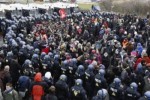 Urban Violence: a round-up as of autumn 2011
Urban Violence: a round-up as of autumn 2011
Paris – 23, September 2011 – Urban violence is a subject that is particularly difficult to grasp for those who are directly or indirectly involved in implementing a local security or prevention policy, primarily because the concept is difficult to define. Indeed, the term ‘urban violence’ does not cover the same ground in every country, especially in legal terms. There are few universally accepted definitions of the term.
One point that people do agree upon is that it is certainly not a new phenomenon, but one that is not only ingrained in history, but has probably also often influenced it. Most recorded occurrences of urban violence involve fairly explicit social or political demands and are a result of deep social or societal unrest.
In the 80s, a new form of urban violence appeared; the case of Les Minguettes, in the suburb of Lyon (France), is often cited as an example of this. Each case of urban violence is unique because the phenomenon is so complex, but there are key trends common to many cases.
It is interesting, for example, to highlight the location and timing of occurrences of urban violence. The fact that most riots since 1980 have taken place in suburbs and at night must be significant. The lack of a single, recognised leader is also striking, as is the trigger for the violence which, since 1980, has often been a precise, identifiable event. Issues including the State’s legitimacy, an increase in discrimination and the crystallisation of cultural and religious identities should also be taken into account. So, too, should new forms of communication, which are undeniably another factor to take into account in the appearance and spread of urban violence.
It is also interesting to highlight that few European countries have been spared occurrences of urban violence and therefore that, in terms of prevention, no existing model of societal life is perfect. England may well have monopolised attention on this subject recently, but we can cite examples of riots in many other places: Brussels at the beginning of the 90s, Rostock in Germany (1992), Brixton in England (1995), France (2005), Slotervaart in the Netherlands (2006), Hungary (2006), Madrid (2007), Copenhagen (2007 and 2008) and Athens (2008).
As well as the context, it is vital to bear in mind that this violence, which takes place in cities, is also closely linked to how we view and shape these cities. This is one of the main reasons why Efus and many of its partners have wanted to address the issue and act on it for a number of years.
Reco street violence (2011-2013)
This project aims to gather existing knowledge on this complex subject and to make that knowledge available to practitioners, political decision-makers and researchers in Europe. The project plans to create a space for recommendations, structured with an online database, which will make it possible to carry out analyses and comparisons to produce political guidelines.
Efus is implementing the project in partnership with the Belgian Forum (FBPSU), the Spanish Forum (FEPSU), the Emilia-Romagna region (Italy), the National Community Safety Network (NCSN – UK) and the French IT engineering (Psytel) as well as making use of the expertise of the French Forum (FFSU).
Comparative report on methods of intervention with young people at risk of joining a street gang
Practices in Belgium, Canada and France
In March 2011, the International Centre for the Prevention of Crime (CIPC) published a comparative report on methods of intervention with young people at risk of joining a street gang. The publication presents eleven different prevention practices through an international comparison. From Canada to Belgium to France, it is a matter of describing ways of intervening based on prevention, mediation and disaffiliation of gangs.
“Cities facing collective violence” conference, Toulouse, 2009
As part of the 2009 general assembly, Efus focussed on the matter of collective violence. There are links below to several French and European practices that were presented at the general assembly, as well as to interviews with elected officials and actors in the field in La Rochelle, Chalon-sur-Saône, Sarcelles, Valenciennes and Aubervilliers.
More information: http://www.ffsu.org/index.php?id=30345
Video: http://www.efus.eu/fr/topics/risks-forms-of-crime/collective-violence/efus/1408/
The phenomenon of gangs in France (2001-2006)
The French Forum for Urban Security has been running a working group for five years on the topic of gangs of young people from a national point of view. You can find information about this working group and the publication here.
More information: http://www.ffsu.org/index.php?id=31866
Publication: http://www.ffsu.org/index.php?id=10297
In addition, several articles, announcements and other texts on the subject have been produced as part of the Forum’s reflective work in recent years. They are often linked to or based on more detailed articles from the national press. You can find them below.
New initiatives for fighting crime after the December 2008 riots in Athens
http://www.efus.eu/fr/policies/national/greece/public/917/
Suffering and revolt of the ‘included’
Key points to aid understanding of the revolt in December 2008
http://www.efus.eu/fr/policies/national/greece/public/916/
Announcement from the president of the French Forum concerning the 2005 riots and a selective press review
http://www.efus.eu/fr/policies/national/france/public/1054/
United Kingdom 2011-09-22
http://www.local.gov.uk/web/10161/media-releases/-/journal_content/56/10161/92401/NEWS-TEMPLATE
http://www.youphil.com/fr/article/04241-angleterre-la-pauvrete-responsable-des-emeutes?ypcli=ano
http://www.courrierinternational.com/article/2011/08/11/jamais-sans-ma-capuche
http://www.courrierinternational.com/article/2011/08/12/les-lions-et-les-singes-galonnes
http://www.courrierinternational.com/article/2011/08/09/il-faut-declarer-l-etat-d-urgence
Which is co-financed by the European Commission as part of the Daphne III programme
Source: http://www.efus.eu/en/topics/risks-forms-of-crime/collective-violence/efus/2326/
